Petroleum Minister Musadik Malik of Pakistan confirmed on Monday that his country made a major purchase of Russian crude oil using the Chinese yuan currency, presented as a rare public relations victory for a government struggling to contain routine riots.
Pakistan is one of several Southeast Asian nations appearing to take advantage of steep discounts on the price of Russian oil, a product of Western sanctions on the Russian petroleum industry meant as a rebuke of Russia’s ongoing invasion and colonization of Ukraine. India, China, and Saudi Arabia have become some of Russia’s top clients, in some cases reportedly purchasing Russian crude to refine and sell at a significant profit.
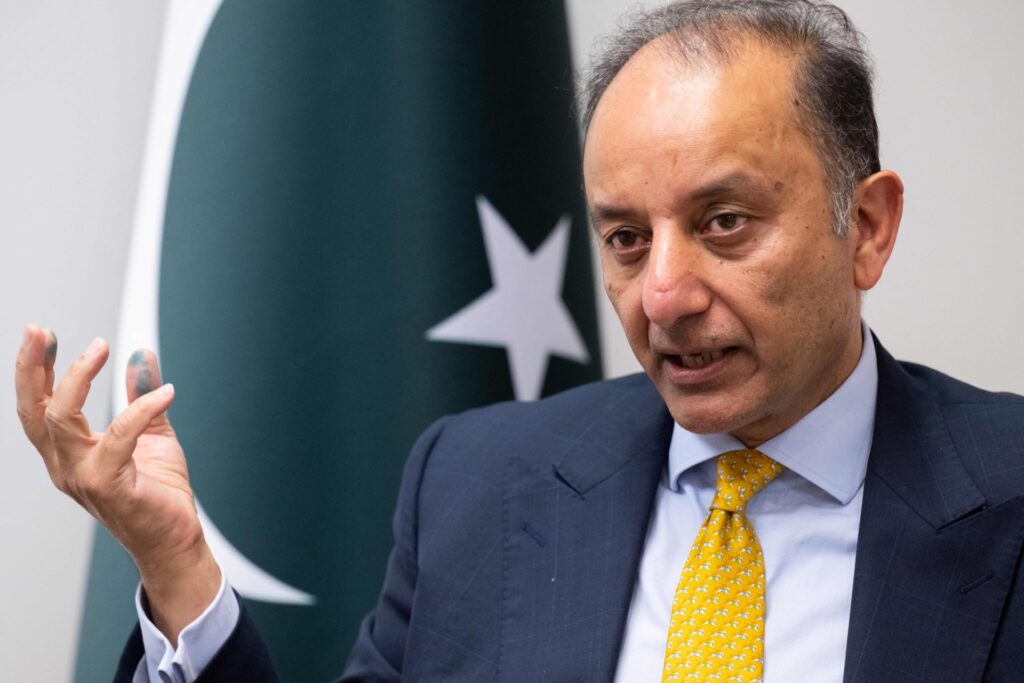
Pakistani Petroleum Minister Musadik Malik speaks during an interview with AFP at the Embassy of Pakistan in Washington, DC, on May 8, 2023. (SAUL LOEB / AFP) (Photo by SAUL LOEB/AFP via Getty Images)
The sanctions have, in addition to limiting the potential market for Russian oil, made it difficult for Russia to conduct international trade using the U.S. dollar. The sanctions prohibit most major Russian banks from using the Society for Worldwide Interbank Financial Telecommunication, or SWIFT, a system widely used for efficient trade among countries.
Russian leaders have repeatedly called for the international community to abandon the U.S. dollar as the standard currency for international transactions. It has received support from the BRICS trade and security coalition — an alliance between Russia and Brazil, India, China, and South Africa — which has established its own development bank to rival the International Monetary Fund (IMF) and whose leaders have promoted the yuan as a dollar alternative.
The government of left-wing American President Joe Biden, which has led the charge to sanction Russia for the Ukraine invasion, publicly expressed no objection to Pakistan’s plans to buy Russian oil in April, prior to the completion of the agreement. The first batch of Russian oil arrived in Karachi on Sunday.
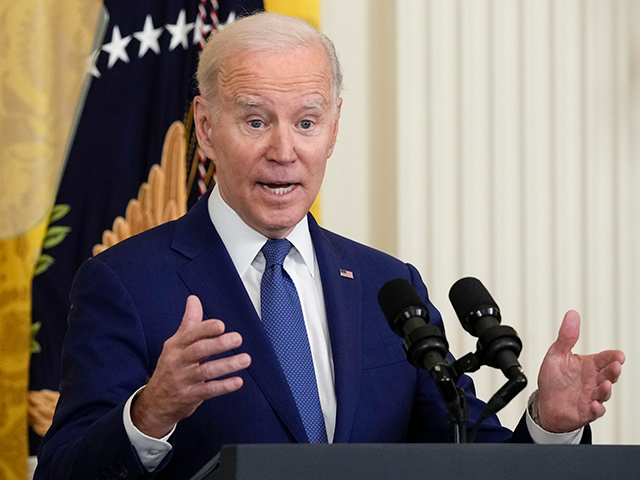
President Joe Biden speaks during an event in the East Room of the White House in Washington, Thursday, March 23, 2023, celebrating the 13th anniversary of the Affordable Care Act. (AP Photo/Susan Walsh)
“I have fulfilled another of my promises to the nation. Glad to announce that the first Russian discounted crude oil cargo has arrived in Karachi and will begin oil discharge tomorrow,” Prime Minister Shehbaz Sharif announced on Sunday. “Today is a transformative day. We are moving one step at a time toward prosperity, economic growth and energy security & affordability.”
Sharif noted that the shipment was the first of its kind in history — Pakistan has traditionally been a U.S. ally, while regional rival India has long been aligned with Russia — and called it the “beginning of a new relationship between Pakistan and Russian Federation.”
Malik, the oil minister, confirmed to Reuters on Monday that Pakistan paid for the oil in yuan.
“Petroleum Minister Musadik Malik, speaking to Reuters by telephone, did not disclose the commercial details of the deal, including pricing or the discount that Pakistan received, but said, the ‘payment (was) made in RMB),'” the news agency relayed. Malik reportedly did confirm the size of the first shipment: 45,000 tonnes of oil, the first of a total of 100,000 tonnes bought in the April agreement, and insisted the price made it impossible for Pakistan to “make a loss” in refining the oil and selling it.
While Sharif — facing months of discontent from ardent supporters of ousted predecessor Imran Khan, who Sharif’s government effectively banned from television in early June — attempted to portray the sale as an immediate boost to Pakistanis’ pockets, Malik warned in late May that the first shipments from would likely make little immediate difference in gasoline prices, as they still had to be refined and worked into the Pakistani market.
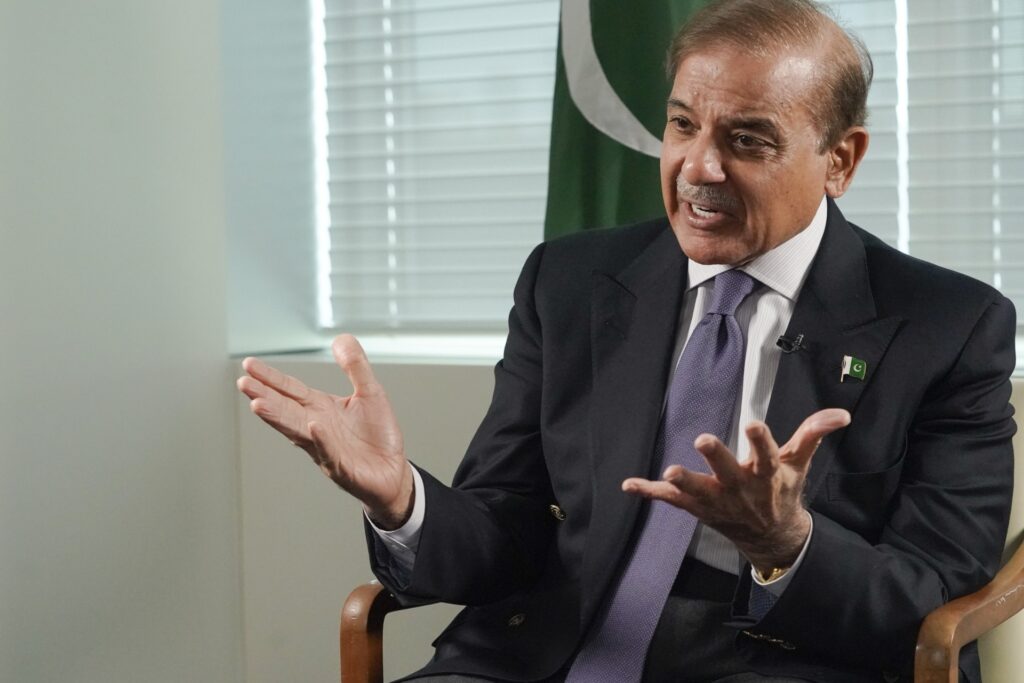
Prime Minister of Pakistan Shehbaz Sharif speaks during an interview with the Associated Press on September 22, 2022, at United Nations headquarters. (AP Photo/Mary Altaffer)
“Once the supply becomes persistent, the fuel cost will gradually decrease,” he promised. Malik suggested that Pakistan could incorporate Russia as a regular supplier of oil in the market, or any other country, “if today we get cheaper sources of energy.”
The Pakistani newspaper Dawn noted on Sunday that the country largely depends on Middle Eastern countries for its petroleum fuels supply. About 80 percent of its oil comes from Saudi Arabia and the United Arab Emirates (UAE), among other Mideast suppliers.
Russia has actively engaged the Sharif government, seeking closer ties to Pakistan, despite its historic ties to India. Commemorating the 75th anniversary of diplomatic ties between the two countries on Monday, Foreign Minister Sergei Lavrov applauded Pakistan for allegedly supporting Russia’s ambitions in “shaping a more just and democratic multipolar world order,” presumably with less American influence globally.
“I would like to note that Russia’s vision of the world order and our understanding of traditional moral values is in harmony with the principles of faith, unity and discipline formulated by the Father of the Pakistani people Muhammad Ali Jinnah,” Lavrov said, according to the Pakistani Express Tribune. “We consider the Islamic Republic of Pakistan to be a key international partner in the joint efforts to combat common security challenges and threats, including trans-border crime and terrorism.”
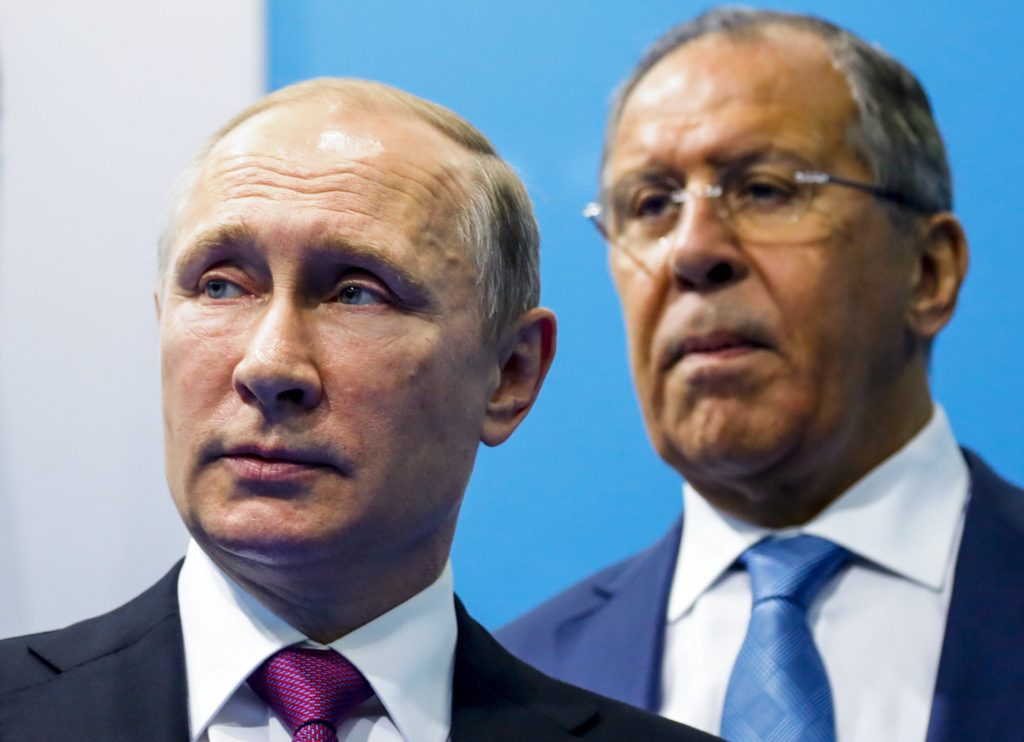
Russian President Vladimir Putin, left, and Foreign Minister Sergey Lavrov. (AP Photo/Alexander Zemlianichenko)
Pakistan joins India, China, and Saudi Arabia as the primary beneficiaries of discounted Russian crude oil sales. China and India reportedly imported record amounts of Russian crude in May, while Saudi Arabia has dramatically increased its imports and is reportedly selling the product at a much higher markup after refining it. Some reports have also accused India of using its refining capacity to process and sell Russian oil.
Russia and its BRICS partners have openly discussed replacing the U.S. dollar as the standard currency for international trade, using potential membership for more nations as a tool to promote the plan. Saudi Arabia, Iran, and Argentina are among the potential candidates to join the alliance.
“Ways to reduce the role of the US dollar in financial transactions between member states will be another focus of attention. The Russian president stated earlier that together with other BRICS nations, Moscow was working on alternative mechanisms of payment,” the Russian news agency Tass reported last year.
Argentina signed a deal in April to conduct its trade with China in yuan, affecting about $1.04 billion in Chinese imports. Brazil, already a BRICS member, signed a similar agreement a month prior to create a “clearing house” using the Industrial and Commercial Bank of China (ICBC) to process trade deals, eliminating the U.S. dollar.
“The expectation is that this will reduce costs … promote even greater bilateral trade and facilitate investment,” the Brazilian Trade and Investment Promotion Agency (Apex Brasil) said in a statement announcing the agreement.
Saudi Finance Minister Mohammed al-Jadaan said in January that the country is open to trade deals outside of the use of the dollar.
“There are no issues with discussing how we settle our trade arrangements, whether it is in the U.S. dollar, whether it is the euro, whether it is the Saudi riyal. I don’t think we are waving away or ruling out any discussion that will help improve the trade around the world,” al-Jadaan asserted.
RELATED VIDEO: White House: “We’ve Chosen” to Keep Russian Oil “on the Market So Supply Is There” but We Make Sure “We’re Not Rewarding Putin Twice”:
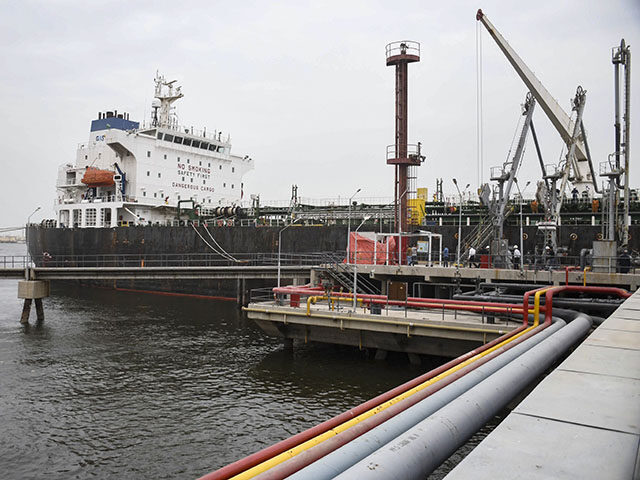
COMMENTS
Please let us know if you're having issues with commenting.